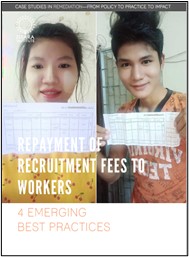A growing number of global brands and retailers are adopting ethical recruitment policies stipulating, among other things, that all costs and fees related to labour recruitment are paid by the employer and not by the workers being recruited. Employer Pays Policies (EPP) are important in protecting workers from persistent and sometimes exorbitant debt that can take months or even years to clear – especially when illegal and “under the table” fees are so easily burdened on workers by informal brokers in less regulated environments.
Employer Pays Policies have been the center of discussion for fora such as the Leadership Group for Responsible Recruitment, Responsible Labor Initiative (RLI), Consumer Goods Forum (CGF), Fair Labor Association (FLA), and American Apparel and Footwear Association (AAFA) for several years now. These commitments are important both as signposts for the direction that business and industry is heading, and to advance ethical supply practices. The pace of moving from commitments and policy to more concrete action within supply chains needs to accelerate and has been called for from these discussions. Too many workers in the supply chains of these brands and retailers still see limited impact on the ground, and improved supplier and recruitment agency systems yet to be transformed. There is a smaller community of more progressive businesses that are already operationalizing, or are ready to operationalize their Employer Pays policies, and this community is indeed growing. Organizations such as Verité and Impactt have been working with many of these companies on the practical aspects of recruitment fees repayment for several years now.
Issara Institute, founded in 2014, has been working on advancing more ethical recruitment practices within supply chains since its founding, including work on aspects of ethical recruitment such as more transparent, ethical terms of engagement, more ethical and professionalized conduct on the part of employers and recruitment agencies toward each other and toward workers, and monitoring and verifying true labour recruitment conditions through worker voice. Two seminal investigations in 2018 outlined a feasible financial model for ethical recruitment in Southeast Asia (and technical approach for creating such models), and emerging signals of behaviour and systems change on the part of recruiters, suppliers, and jobseekers from the implementation of Issara’s worker voice-driven ethical recruitment programming.

